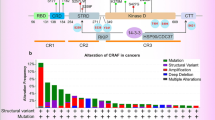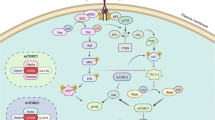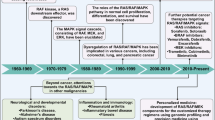Abstract
The Raf-mitogen activated protein kinase kinase (MEK)-extracellular signal-regulated kinase (ERK) protein kinase signaling cascade is an important intracellular pathway whose activation influences many fundamental cellular processes and whose aberrancy is associated with cancer cell growth. In addition to activation from within by, for example, Raf mutations, this pathway is frequently activated from above by mutated Ras or epidermal growth factor receptor (EGFR). Given the near ubiquity of derangements affecting at least part of this network in cancer, there is a strong and clear rationale for interrupting it. In recent times, in colorectal and lung cancer, Ras and EGFR mutant status have been shown to be critically important and mutually exclusive predictors of response to anti-EGFR therapies. These developments underline the importance of targeting downstream effectors, and MEK inhibition has been the subject of intense scientific and clinical research for some time now. This article reviews the current status of MEK inhibitors with regard to their clinical development.

Similar content being viewed by others
References
Hurwitz H, Fehrenbacher L, Novotny W et al (2004) Bevacizumab plus irinotecan, fluorouracil, and leucovorin for metastatic colorectal cancer. N Engl J Med 350:2335–2342
Slamon DJ, Leyland-Jones B, Shak S et al (2001) Use of chemotherapy plus a monoclonal antibody against HER2 for metastatic breast cancer that overexpresses HER2. N Engl J Med 344:783–792
Shepherd FA, Rodrigues Pereira J, Ciuleanu T et al (2005) Erlotinib in previously treated non-small-cell lung cancer. N Engl J Med 353:123–132
Piccart-Gebhart MJ, Procter M, Leyland-Jones B et al (2005) Trastuzumab after adjuvant chemotherapy in HER2-positive breast cancer. N Engl J Med 353:1659–1672
Romond EH, Perez EA, Bryant J et al (2005) Trastuzumab plus adjuvant chemotherapy for operable HER2-positive breast cancer. N Engl J Med 353:1673–1684
Pao W, Miller V, Zakowski M et al (2004) EGF receptor gene mutations are common in lung cancers from "never smokers" and are associated with sensitivity of tumors to gefitinib and erlotinib. Proc Natl Acad Sci USA 101:13306–13311
Pao W, Ladanyi M, Miller VA (2005) Erlotinib in lung cancer. N Engl J Med 353:1739–1741 author reply 1741
Pao W, Wang TY, Riely GJ et al (2005) KRAS mutations and primary resistance of lung adenocarcinomas to gefitinib or erlotinib. PLoS Med 2:e17
Lievre A, Bachet JB, Le Corre D et al (2006) KRAS mutation status is predictive of response to cetuximab therapy in colorectal cancer. Cancer Res 66:3992–3995
Weinberg RA (2007) The biology of cancer. Garland Science, Taylor & Francis Group, LLC., New York
Zuber J, Tchernitsa OI, Hinzmann B et al (2000) A genome-wide survey of RAS transformation targets. Nat Genet 24:144–152
Schulze A, Lehmann K, Jefferies HB, McMahon M, Downward J (2001) Analysis of the transcriptional program induced by Raf in epithelial cells. Genes Dev 15:981–994
Schulze A, Nicke B, Warne PH, Tomlinson S, Downward J (2004) The transcriptional response to Raf activation is almost completely dependent on Mitogen-activated Protein Kinase Kinase activity and shows a major autocrine component. Mol Biol Cell 15:3450–3463
Malumbres M, Barbacid M (2003) RAS oncogenes: the first 30 years. Nat Rev Cancer 3:459–465
Pratilas CA, Hanrahan AJ, Halilovic E et al (2008) Genetic predictors of MEK dependence in non-small cell lung cancer. Cancer Res 68:9375–9383
Cowley S, Paterson H, Kemp P, Marshall CJ (1994) Activation of MAP kinase kinase is necessary and sufficient for PC12 differentiation and for transformation of NIH 3T3 cells. Cell 77:841–852
Roberts PJ, Der CJ (2007) Targeting the Raf-MEK-ERK mitogen-activated protein kinase cascade for the treatment of cancer. Oncogene 26:3291–3310
Robinson MJ, Cobb MH (1997) Mitogen-activated protein kinase pathways. Curr Opin Cell Biol 9:180–186
Hoshino R, Chatani Y, Yamori T et al (1999) Constitutive activation of the 41-/43-kDa mitogen-activated protein kinase signaling pathway in human tumors. Oncogene 18:813–822
Pratilas CA, Taylor BS, Ye Q et al (2009) V600EBRAF is associated with disabled feedback inhibition of RAF-MEK signaling and elevated transcriptional output of the pathway. Proc Natl Acad Sci U S A 106(11):4519–4524
Moore MJ, Goldstein D, Hamm J et al (2007) Erlotinib plus gemcitabine compared with gemcitabine alone in patients with advanced pancreatic cancer: a phase III trial of the National Cancer Institute of Canada Clinical Trials Group. J Clin Oncol 25:1960–1966
Solit DB, Garraway LA, Pratilas CA et al (2006) BRAF mutation predicts sensitivity to MEK inhibition. Nature 439:358–362
Gregorj C, Ricciardi MR, Petrucci MT et al (2007) ERK1/2 phosphorylation is an independent predictor of complete remission in newly diagnosed adult acute lymphoblastic leukemia. Blood 109:5473–5476
Dhanasekaran N, Premkumar Reddy E (1998) Signaling by dual specificity kinases. Oncogene 17:1447–1455
Catalanotti F, Reyes G, Jesenberger V et al (2009) A Mek1-Mek2 heterodimer determines the strength and duration of the Erk signal. Nat Struct Mol Biol 16:294–303
Friday BB, Adjei AA (2008) Advances in targeting the Ras/Raf/MEK/Erk mitogen-activated protein kinase cascade with MEK inhibitors for cancer therapy. Clin Cancer Res 14:342–346
Ohren JF, Chen H, Pavlovsky A et al (2004) Structures of human MAP kinase kinase 1 (MEK1) and MEK2 describe novel noncompetitive kinase inhibition. Nat Struct Mol Biol 11:1192–1197
Lorusso PM, Adjei AA, Varterasian M et al (2005) Phase I and pharmacodynamic study of the oral MEK inhibitor CI-1040 in patients with advanced malignancies. J Clin Oncol 23:5281–5293
Rinehart J, Adjei AA, Lorusso PM et al (2004) Multicenter phase II study of the oral MEK inhibitor, CI-1040, in patients with advanced non-small-cell lung, breast, colon, and pancreatic cancer. J Clin Oncol 22:4456–4462
Menon SS, Whitfield LR, Sadis S et al (2005) Pharmacokinetics (PK) and pharmacodynamics (PD) of PD 0325901, a second generation MEK inhibitor after multiple oral doses of PD 0325901 to advanced cancer patients. J Clin Oncol 23:3066 Meeting Abstracts
Lorusso P, Krishnamurthi S, Rinehart JR et al (2005) A phase 1–2 clinical study of a second generation oral MEK inhibitor, PD 0325901 in patients with advanced cancer. J Clin Oncol 23:3011 Meeting Abstracts
Zhang Q, Feng W, Zhou H, Yan B (2009) Advances in preclinical small molecules for the treatment of NSCLC. Expert Opin Ther Pat 19:731–751
Yeh TC, Marsh V, Bernat BA et al (2007) Biological characterization of ARRY-142886 (AZD6244), a potent, highly selective mitogen-activated protein kinase kinase 1/2 inhibitor. Clin Cancer Res 13:1576–1583
Huynh H, Soo KC, Chow PK, Tran E (2007) Targeted inhibition of the extracellular signal-regulated kinase kinase pathway with AZD6244 (ARRY-142886) in the treatment of hepatocellular carcinoma. Mol Cancer Ther 6:138–146
Davies BR, Logie A, McKay JS et al (2007) AZD6244 (ARRY-142886), a potent inhibitor of mitogen-activated protein kinase/extracellular signal-regulated kinase kinase 1/2 kinases: mechanism of action in vivo, pharmacokinetic/pharmacodynamic relationship, and potential for combination in preclinical models. Mol Cancer Ther 6:2209–2219
Haass NK, Sproesser K, Nguyen TK et al (2008) The mitogen-activated protein/extracellular signal-regulated kinase kinase inhibitor AZD6244 (ARRY-142886) induces growth arrest in melanoma cells and tumor regression when combined with docetaxel. Clin Cancer Res 14:230–239
Adjei AA, Cohen RB, Franklin W et al (2008) Phase I pharmacokinetic and pharmacodynamic study of the oral, small-molecule mitogen-activated protein kinase kinase 1/2 inhibitor AZD6244 (ARRY-142886) in patients with advanced cancers. J Clin Oncol 26:2139–2146
O'Neil BH, Williams-Goff LW, Kauh J et al (2009) A phase II study of AZD6244 in advanced or metastatic hepatocellular carcinoma. J Clin Oncol 27:e15574 Meeting Abstracts
Lang I, Adenis A, Boer K et al (2008) AZD6244 (ARRY-142886) versus capecitabine (CAP) in patients (pts) with metastatic colorectal cancer (mCRC) who have failed prior chemotherapy. J Clin Oncol 26:4114 Meeting Abstracts
Bekaii-Saab T PM, Li X et al (2009) A multi-institutional study of AZD6244 (ARRY-142886) in patients with advanced biliary tract cancers. Proc Am Assoc Cancer Res 2009: abstract LB-129)
Dummer R, Robert C, Chapman PB, Sosman JA, Middleton M, Bastholt L, Kemsley K, Cantarini MV, Morris C, Kirkwood JM (2008) AZD6244 (ARRY-142886) vs temozolomide (TMZ) in patients (pts) with advanced melanoma: An open-label, randomized, multicenter, phase II study. J Clin Oncol 26: abstract 9033
Friday BB, Yu C, Dy GK et al (2008) BRAF V600E disrupts AZD6244-induced abrogation of negative feedback pathways between extracellular signal-regulated kinase and Raf proteins. Cancer Res 68:6145–6153
O'Reilly KE, Rojo F, She QB et al (2006) mTOR inhibition induces upstream receptor tyrosine kinase signaling and activates Akt. Cancer Res 66:1500–1508
Daouti S, Wang H, Li WH et al (2009) Characterization of a novel mitogen-activated protein kinase kinase 1/2 inhibitor with a unique mechanism of action for cancer therapy. Cancer Res 69:1924–1932
Rosen LS, Galatin P, Fehling JM et al (2008) A phase 1 dose-escalation study of XL518, a potent MEK inhibitor administered orally daily to subjects with solid tumors. J Clin Oncol 26:14585 Meeting Abstracts
Jimeno A, Rubio-Viqueira B, Amador ML et al (2007) Dual mitogen-activated protein kinase and epidermal growth factor receptor inhibition in biliary and pancreatic cancer. Mol Cancer Ther 6:1079–1088
Balko JM, Jones BR, Coakley VL, Black EP (2009) Combined MEK and EGFR inhibition demonstrates synergistic activity in EGFR-dependent NSCLC. Cancer Biol Ther 8(6):522–530
Ou D-L, Shen Y-C, Yu S-L et al (2008) Potential synergistic anti-tumor effects between sorafenib and the MEK inhibitor CI1040 in hepatocellular carcinoma (HCC). AACR Meeting Abstracts:1435
Llovet JM, Ricci S, Mazzaferro V et al (2008) Sorafenib in advanced hepatocellular carcinoma. N Engl J Med 359:378–390
Peng CL, Guo W, Ji T et al (2009) Sorafenib induces growth inhibition and apoptosis in human synovial sarcoma cells via inhibiting the RAF/MEK/ERK signaling pathway. Cancer Biol Ther 8(18):1729–1736
Wilhelm SM, Adnane L, Newell P, Villanueva A, Llovet JM, Lynch M (2008) Preclinical overview of sorafenib, a multikinase inhibitor that targets both Raf and VEGF and PDGF receptor tyrosine kinase signaling. Mol Cancer Ther 7:3129–3140
Ulivi P, Arienti C, Amadori D et al (2009) Role of RAF/MEK/ERK pathway, p-STAT-3 and Mcl-1 in sorafenib activity in human pancreatic cancer cell lines. J Cell Physiol 220:214–221
Balmanno K, Chell SD, Gillings AS, Hayat S, Cook SJ (2009) Intrinsic resistance to the MEK1/2 inhibitor AZD6244 (ARRY-142886) is associated with weak ERK1/2 signalling and/or strong PI3K signalling in colorectal cancer cell lines. Int J Cancer 125(10):2332–2341
Paternot S, Roger PP (2009) Combined inhibition of MEK and mammalian target of rapamycin abolishes phosphorylation of cyclin-dependent kinase 4 in glioblastoma cell lines and prevents their proliferation. Cancer Res 69:4577–4581
McDaid HM, Legrier M, Yang CH et al (2007) Combined MEK and mTOR suppression is synergistic in human NSCLC and is mediated via inhibition of protein translation. J Clin Oncol (Meeting Abstracts) 25:10615
Cannistra SA (2009) Phase II trials in journal of clinical oncology. J Clin Oncol 27:3073–3076
Acknowledgements
The content of this publication does not necessarily reflect the views or policies of the Department of Health and Human Services, nor does mention of trade names, commercial products, or organizations imply endorsement by the US Government. This research was supported by the Intramural Research Program of the NIH, National Cancer Institute, Center for Cancer Research.
Conflict of interest statement
No funds were received in support of this study and no benefits in any form have been or will be received from a commercial party related directly or indirectly to the subject of this manuscript.
Author information
Authors and Affiliations
Corresponding author
Rights and permissions
About this article
Cite this article
Duffy, A., Kummar, S. Targeting mitogen-activated protein kinase kinase (MEK) in solid tumors. Targ Oncol 4, 267–273 (2009). https://doi.org/10.1007/s11523-009-0125-x
Received:
Accepted:
Published:
Issue Date:
DOI: https://doi.org/10.1007/s11523-009-0125-x




